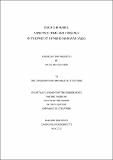| dc.contributor.advisor | Ryan, Judith L. | |
| dc.contributor.advisor | Ashtiany, Mohsen | |
| dc.contributor.author | Huber, Marie Denise | |
| dc.date.accessioned | 2013-09-19T12:57:06Z | |
| dc.date.issued | 2013-09-19 | |
| dc.date.submitted | 2013 | |
| dc.identifier.citation | Huber, Marie Denise. 2013. Bagh-e Bi-Bargi: Aspects of Time and Presence in the Poetry of Mehdi Akhavan Sales. Doctoral dissertation, Harvard University. | en_US |
| dc.identifier.other | http://dissertations.umi.com/gsas.harvard:10965 | en |
| dc.identifier.uri | http://nrs.harvard.edu/urn-3:HUL.InstRepos:11064405 | |
| dc.description.abstract | Mehdi Akhavan Sales (1928-1990) is one of the most important figures in modern Persian literature. However, his poetry is little known in the West. Even in Iran, though held in high regard, his work is considered hermetic. There is no unambiguous message, no identifiable political or aesthetic doctrine. Still, his poems exert a strange, haunting power. What do they tell us, now, two decades after the poet's death? What do they mean outside their homeland? What is their voice in world literature? These are the questions my dissertation seeks to answer. Chapters on rhythm, metaphor, time and - lyrical and epic - voice aim to place Akhavan in the comparative context of the 20th century literary movements. Following the philosophical hermeneutics of, above all, Paul Ricoeur, I attempt to tease out layers of meaning and bring Akhavan's poems to life for a contemporary reader. Aspects of time and presence throughout serve to structure my argument. In parallel, time and presence are traced as motifs that weave through Akhavan's writing. Through close readings of a wide range of poems I seek to understand Akhavan's texts as crystallisations of a historical moment. However, I also argue that his poems can no longer be explained within the linear evolution of Persian literary history: in their language and imagery, they point to an elsewhere that has not yet been mapped. Akhavan avoids ideological statements and political imperatives. All the same, an ethical stance is manifest in his poetry. Form itself takes on significance. Chapter 1 examines how Ahkavan makes the human time of rhythm converge with the time of the poem. Chapter 2 explores how definitions of metaphor affect the belief in literature's potential to describe and refigure reality. Chapter 3 elucidates the processes by which time is imagined as an unattainable space. Hope and desire belong elsewhere, as does salvation. Chapter 4 treats the genres of lyric and epic as distinct configurations of time. Akhavan's love poetry is a poetry of absence, reaching out to an elusive Other, while his narrative poems adumbrate the possibility of a different, gladder history in the interstices of language. | en_US |
| dc.language.iso | en_US | en_US |
| dash.license | LAA | |
| dc.subject | Comparative literature | en_US |
| dc.subject | Middle Eastern literature | en_US |
| dc.subject | Iran | en_US |
| dc.subject | Modern | en_US |
| dc.subject | Persian | en_US |
| dc.subject | Poetry | en_US |
| dc.title | Bagh-e Bi-Bargi: Aspects of Time and Presence in the Poetry of Mehdi Akhavan Sales | en_US |
| dc.type | Thesis or Dissertation | en_US |
| dash.depositing.author | Huber, Marie Denise | |
| dc.date.available | 2013-09-19T12:57:06Z | |
| thesis.degree.date | 2013 | en_US |
| thesis.degree.discipline | Comparative Literature | en_US |
| thesis.degree.grantor | Harvard University | en_US |
| thesis.degree.level | doctoral | en_US |
| thesis.degree.name | Ph.D. | en_US |
| dc.contributor.committeeMember | Ryan, Judith | en_US |
| dc.contributor.committeeMember | Ashtiany, Mohsen | en_US |
| dc.contributor.committeeMember | Giron-Negron, Luis Manuel | en_US |
| dash.contributor.affiliated | Huber, Marie Denise | |


